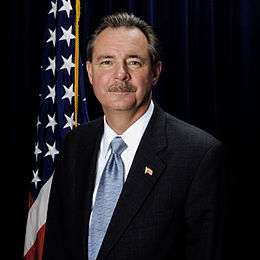Certified Homeland Protection Professional
In the United States, Certified Homeland Protection Professional (CHPP) is a professional certification established by the National Sheriffs' Association in partnership with the National Domestic Preparedness Coalition, through the Global Center for Threat, Risk, and Vulnerability. The designation certifies that individuals have demonstrated competency, knowledge, skills, and abilities in the blended discipline of Homeland Protection, through a rigorous qualification and testing program.
| Professional Designation | |
| Industry | Homeland Security |
| Founded | National Sheriffs' Association National Domestic Preparedness Coalition |
| Headquarters | Alexandria, Virginia |
Background information
The lines separating the responsibilities of emergency response disciplines were blurred after the September 11th, 2001 attacks. To address these newly melded responsibilities, the profession of Homeland Security was created. This designation was established to ensure that an individual who possesses the designation has the requisite knowledge, skills and abilities to be considered a professional in the area of homeland protection. Those who hold this designation are prepared to help their organizations prevent, protect against, prepare for, respond to, mitigate and recover from all hazards. They have demonstrated competency, knowledge, skills and abilities in the blended discipline area of Homeland Protection and have completed a rigorous qualification and testing program.[1]
Certification board
The CHPP is backed by a certification board that consists of recognized leaders in the Homeland Protection Arena. Board members include law enforcement leaders, private industry security professionals, homeland security leadership, fire service leadership, emergency management leadership, and health and medical professionals. The certification board reviews all Certified Homeland Security Professional requirements and ensures that they meet the highest standards. The Board Certification provides an objective means of distinguishing highly competent homeland protection professionals from their less experienced peers.[2]

Composition
The Certification Board consists of the seven members below:
-
| Board Member | Notability |
|---|---|
| Roland Cloutier | Vice President with Automatic Data Processing |
| Joshua Filler | Former Director with United States Department of Homeland Security |
| Kenneth Glantz | Executive Director with the National Domestic Preparedness Coalition |
| Mark Keim | Senior Science Advisor with the Centers for Disease Control and Prevention |
| R. David Paulison | Former Administrator of Federal Emergency Management Agency |
| Richard Stanek | Sheriff with Hennepin County |
| C. Allan Turner | Professor Emeritus with George Mason University |
Requirements
Candidates for the CHPP must meet several requirements:[3]
- U.S. Citizenship
- At least 21 years of age
- No felony convictions
- No dishonorable discharge from the U.S. military (for U.S. Veterans only)
- Neither a record of disciplinary action from any state, province or territory, or licensing or certification board within the past 10 years nor subject under any such investigation
- Four (4) years of experience as a responder, security professional or emergency manager.
- Or: Associate degree and at least 3 years of experience as a responder, security professional or emergency manager.
- Or: Bachelor's Degree and at least 2 years of experience as a responder, security professional or emergency manager.
- Or: Master’s Degree and 1 year of experience as a responder, security professional or emergency manager.
- Course work in the knowledge areas as approved by the Certification review committee or pass the Online Certified Homeland Protection Professional Course with a minimum score of 80%. NSA Course Certificates, NDPCI Certificates, FEMA and DHS Course Certificates in the knowledge areas will be automatically accepted.
Certification maintenance
As a credentialed professional there a requirements in order to maintain the CHPP designation. Credential holders may earn PDUs towards the maintenance of their credential through taking NSA Course Certificates, National Domestic Preparedness Coalition Certificates, FEMA and DHS Course Certificates. CHPP designees must accrue twenty-four (24) certification credits during each two-year recertification period. Certification credits include membership in professional organizations, course certificates, college courses, speaking engagements, volunteerism, and service on a non-profit board.[4]
See also
- Global Society of Homeland & National Security Professionals
- National Sheriffs' Association
- National Domestic Preparedness Coalition